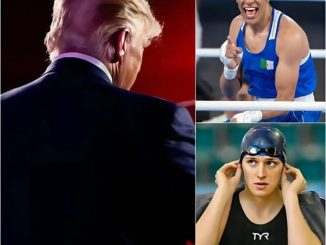Elon Musk Sparks Heated Debate with Call to Boycott Sports Events Allowing Transgender Athletes to Compete in Women’s Categories

In yet another controversial move, Elon Musk, the billionaire CEO of Tesla and SpaceX, has ignited a fierce debate with his recent call to boycott sports events that permit biological males to compete in women’s categories. Musk’s stance on this highly sensitive issue has led to widespread reactions across social media platforms, with passionate responses both in support and against his position. This public dispute has highlighted the growing cultural divide on issues of equity, inclusion, and fairness in competitive sports.
Musk’s Controversial Tweet Sets Social Media Ablaze
The debate erupted when Musk posted a tweet that read: “It’s time to protect women’s sports. Biological men have the right to compete against women. Boycott these events if equity matters.” This provocative statement quickly went viral, igniting heated discussions about gender identity, fairness in sports, and the role of biological differences in competition.

While many supporters of Musk’s opinion praised his bold stance, arguing that protecting women’s sports is necessary for fairness, others vehemently criticized him for allegedly promoting exclusion and transphobia. The tweet raised key questions about how to balance inclusivity and fairness in women’s sports, a discussion that has become increasingly prominent in recent years.
The Growing Debate on Equity in Women’s Sports
The issue of whether biological males should be allowed to compete in women’s sports has been at the heart of a contentious debate for some time. Advocates for transgender inclusion argue that sports should be open to all, regardless of gender identity, and that policies should be in place to ensure equal opportunities for everyone. However, critics, including Musk, argue that biological males, even after undergoing hormone therapy, may retain physical advantages that could undermine fairness in women’s competitions.

Musk’s stance echoes his long-standing criticism of what he perceives as an overemphasis on inclusivity at the expense of fairness. In a follow-up tweet, he clarified his position: “I’m all for inclusivity, but when it comes to competition, fairness matters. Women’s sports should remain a level playing field.” This statement highlights his belief that preserving fairness in women’s athletics is of paramount importance.
Public Reactions: Supporters and Detractors
Musk’s tweet has generated strong reactions from a wide array of people, especially from LGBTQ+ rights groups and prominent figures in the world of sports. Many LGBTQ+ advocates have condemned Musk’s comments, accusing him of perpetuating harmful stereotypes about transgender individuals and misrepresenting the complexity of gender identity.
“These comments are deeply hurtful to athletes who just want to compete like everyone else,” a spokesperson for a leading LGBTQ+ organization stated. “Such rhetoric only serves to marginalize an already vulnerable community.” These critics argue that policies excluding transgender athletes are harmful and discriminatory, asserting that all individuals should be given the opportunity to compete fairly, regardless of their gender identity.

On the other hand, Musk’s position has found support from certain public figures within the sports community. Tennis legend Martina Navratilova, a vocal advocate for fairness in women’s sports, has expressed agreement with Musk’s call for better protections. “It’s about justice,” Navratilova said. “We need to protect the integrity of women’s sports.” Her comments emphasize the importance of ensuring that women’s sports remain competitive and free from what some see as an unfair advantage by athletes whose physical characteristics are distinct from those of female competitors.
The Science Behind the Controversy: Biology vs. Fairness in Competition
One of the central arguments in this debate revolves around the biological differences between men and women, particularly in athletic performance. Critics of allowing biological males to compete in women’s sports point to studies that suggest men generally have physical advantages, such as greater muscle mass and bone density, which can provide an edge in many athletic disciplines. These differences, they argue, cannot be entirely mitigated by hormone therapy, even if it reduces some advantages.

“This is not about hate or discrimination,” explained Dr. James Peterson, a sports scientist. “This is about recognizing that biological differences can affect performance in competitive sports.” For many, this scientific perspective forms the basis of their objection to transgender women competing against biological females, with fairness being their primary concern.
However, supporters of transgender inclusion in sports counter that such biological differences are often overstated, and hormone therapy can significantly reduce many of the advantages that biological males might have. These advocates argue that sports should be about inclusion and that transgender athletes should not be excluded simply because of their gender identity.
A Cultural Divide: Musk’s Stance and the Larger Debate on Inclusivity and Gender
Musk’s comments have highlighted the broader cultural divide that is playing out not just in sports, but across many facets of society. Issues such as gender identity, inclusivity, and fairness are increasingly becoming battlegrounds for public opinion, with little middle ground. Some view Musk’s intervention as a necessary step to protect the fairness of women’s sports, while others see it as a dangerous example of a wealthy individual using his platform to spread exclusionary and divisive opinions.

The growing influence of social media has only intensified this divide, as platforms like Twitter (now X) become spaces where these heated debates unfold in real-time. Musk’s decision to publicly weigh in on this issue has propelled the conversation forward, forcing many to confront difficult questions about the intersection of gender identity, fairness, and the rights of athletes.
What’s Next for Women’s Sports? Will Musk’s Boycott Call Have an Impact?
As the debate continues, the question remains whether Musk’s call for a boycott will have a tangible impact on sports organizations or policy-making. Some governments and athletic bodies have already begun reviewing their policies on the inclusion of transgender athletes in elite sports, but the issue is far from resolved. It is likely that we will continue to see shifting positions on this matter as more research is conducted, and as public opinion continues to evolve.

For Musk, it seems that he is undeterred by the backlash. In a subsequent tweet, he reiterated his belief: “Justice is not hate. Protecting women’s sports is mainstream.” His stance suggests that he sees his position as one of fairness, rather than exclusion, and he is prepared to continue advocating for policies that he believes protect women’s rights in the world of athletics.
As the conversation unfolds, it will be interesting to see whether more public figures, athletes, or policymakers choose to enter the fray, and how this will shape the future of competitive sports. Musk’s influence, coupled with his platform’s ability to amplify his voice, may continue to drive this debate, making it a defining issue in the evolving landscape of sports and gender identity. The coming months will likely see even more heated discussions as this controversial topic continues to capture the public’s attention.


